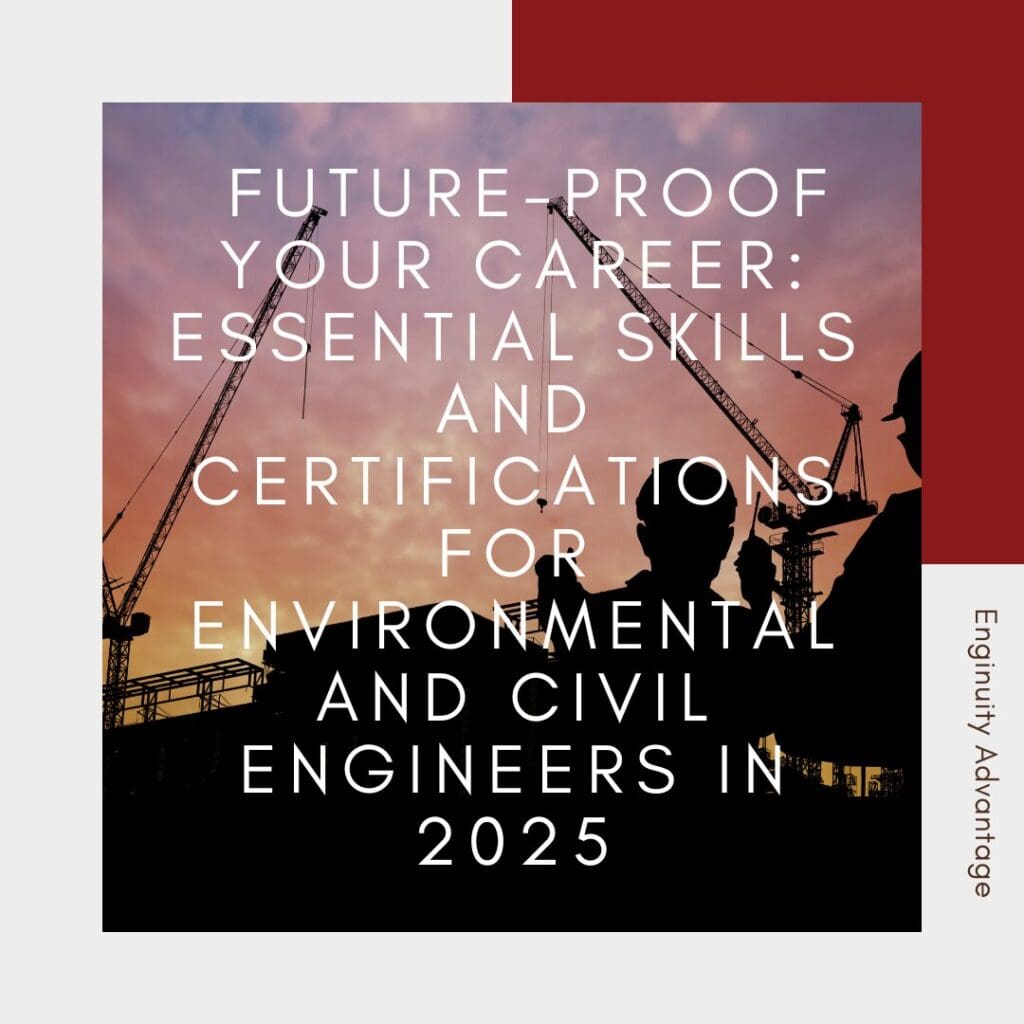Future-Proof Your Career: Essential Skills and Certifications for Environmental and Civil Engineers in 2025

As technology advances and industries evolve, the roles of environmental and civil engineers are becoming more dynamic and demanding. By 2025, the skills and certifications required to excel in these fields will reflect the emphasis on sustainability, data-driven decision-making, and cutting-edge technology. Future-proofing your career involves equipping yourself with tools and expertise that ensure long-term success in an ever-changing landscape.
Adapting to Technological Advancements
The integration of technology into engineering practices has transformed how projects are designed and managed. Building Information Modeling (BIM) has become a cornerstone for collaboration, allowing professionals to create data-rich, 3D models that facilitate real-time problem-solving among architects, engineers, and contractors. Proficiency in BIM tools, such as Autodesk Revit, will be critical as these platforms continue to dominate the industry.
Similarly, Geographic Information Systems (GIS) have expanded their relevance, especially in environmental engineering. GIS tools enable the analysis of spatial data, essential for tasks like mapping ecosystems, monitoring land use, and assessing environmental impacts. Engineers with GIS expertise will have a competitive edge as industries prioritize sustainable solutions.
Artificial intelligence (AI) is also reshaping the engineering landscape. AI-powered tools help optimize designs, analyze data more efficiently, and even predict project outcomes. Familiarity with AI applications, such as predictive modeling and machine learning, will set forward-thinking engineers apart from their peers.
Embracing Sustainability as a Core Focus
Sustainability is no longer just a buzzword—it’s a requirement for modern engineering. Environmental and civil engineers are at the forefront of creating solutions that minimize ecological impact while maximizing resource efficiency. Certifications like Leadership in Energy and Environmental Design (LEED) and Envision Sustainability Professional (ENV SP) credentials demonstrate a commitment to sustainable practices. Engineers who possess these certifications will find themselves well-positioned for roles that demand expertise in green design and infrastructure.
Incorporating sustainable principles goes beyond certification; it’s about applying data and technology to design smarter systems. BIM, paired with sustainability-focused analytics, allows engineers to simulate a building’s energy performance or a project’s environmental impact during the planning phase. These tools enable engineers to make informed decisions that benefit both their projects and the planet.
The Growing Importance of Data and Analysis
As the industry increasingly relies on data-driven solutions, engineers must develop a strong foundation in data analysis and modeling. Tools like SAP2000 and HEC-RAS are invaluable for structural and hydraulic simulations, while broader data analysis platforms, such as Python or Tableau, help interpret trends and optimize performance. Engineers who can integrate technical expertise with data interpretation will be better equipped to solve complex challenges and improve project outcomes.
Data isn’t just about crunching numbers; it’s also about storytelling. Engineers who can present their findings clearly—whether through visuals, reports, or presentations—will stand out in roles that require collaboration with stakeholders and clients. This blend of technical and communication skills is becoming increasingly important in shaping the trajectory of engineering careers.
Building Strong Communication and Collaboration Skills
While technical proficiency remains essential, soft skills like communication and collaboration are becoming equally vital in engineering roles. Engineers are often tasked with explaining complex concepts to non-technical audiences, managing diverse teams, and navigating interdisciplinary projects. Those who can effectively communicate and lead are more likely to advance into leadership positions.
Training programs focused on communication strategies, team dynamics, and leadership development can be invaluable. As engineers progress in their careers, these skills will not only enhance their day-to-day effectiveness but also prepare them for roles in project management and beyond.
Certifications and Credentials for Career Advancement
Certifications continue to be a key differentiator in the competitive job market. For civil engineers, the Professional Engineer (PE) license remains a benchmark of excellence, signifying a commitment to high standards and professional growth. Similarly, environmental engineers benefit from the Certified Environmental Engineer (CEE) credential, which highlights expertise in areas like water quality and air pollution.
In addition to technical certifications, credentials like Project Management Professional (PMP) can open doors to more strategic roles. Engineers who can balance technical knowledge with project management skills are invaluable to organizations looking to deliver complex projects efficiently.
Lifelong Learning and Adaptability
Future-proofing your career requires a mindset of lifelong learning. Engineering is an evolving field, and staying informed about emerging trends, technologies, and methodologies is crucial. Online learning platforms and professional organizations offer numerous resources to keep skills sharp and knowledge current.
Networking is another powerful tool for career growth. Engaging with professional associations like the American Society of Civil Engineers (ASCE) or attending industry conferences provides opportunities to connect with peers, learn from experts, and discover new career opportunities.
Looking Toward 2025 and Beyond
As we approach 2025, the expectations for environmental and civil engineers are higher than ever. Success will depend on a combination of technical expertise, adaptability, and a commitment to sustainability. By mastering the latest technologies, earning relevant certifications, and honing communication skills, engineers can position themselves as leaders in their fields.
For those seeking guidance on navigating career paths in this evolving landscape, Enginuity Advantage offers specialized recruitment services tailored to the needs of environmental and civil engineering professionals. Whether you’re just starting out or looking to take the next step, we can connect you with opportunities that align with your goals. Visit Enginuity Advantage to learn more.
Unlock Dream Careers & Elite Talent: Just One Click Away!


